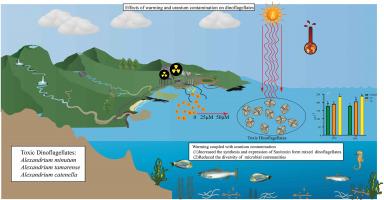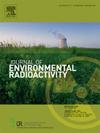Warming coupled with uranium exposure can alter the marine microbial community and induce toxin accumulation in shellfish
IF 2.1
3区 环境科学与生态学
Q3 ENVIRONMENTAL SCIENCES
引用次数: 0
Abstract
This study explores the coupled effects of warming and uranium exposure on marine microbial communities and assesses their potential impact on shellfish toxicity. Different temperature conditions (20 °C and 30 °C) and uranium exposure levels (a controlled setting, 25 μM, and 50 μM) were simulated in an artificial climate chamber. The results indicate that the coupling of warming and uranium exposure significantly altered the water system's properties, including its pH, dissolved oxygen, redox potential, and conductivity. The uranium exposure also significantly altered the diversity and composition of the seawater's microbial community, increasing Pseudomonadota, Flavobacteriia, and Marivita while decreasing Gammaproteobacteria. When subjected to warming and uranium exposure, toxin-producing dinoflagellates exhibited upregulation in toxin anabolism and cell signaling at the gene level, leading to a 25 % increase in toxic synthesis compared to the control group. These changes were positively correlated with temperature and pollution levels, suggesting that uranium exposure and warming promote toxin accumulation in dinoflagellates. The study highlights that seawater warming and uranium exposure synergistically affect microbial community diversity and shellfish toxicity, potentially inducing toxin accumulation in shellfish. Thus, under the conditions of global climate change, uranium exposure may increase the risk of toxin accumulation in shellfish living in seawater.

变暖加上铀暴露可以改变海洋微生物群落并诱导贝类毒素积累
本研究探讨了变暖和铀暴露对海洋微生物群落的耦合影响,并评估了它们对贝类毒性的潜在影响。在人工气候室内模拟不同温度条件(20°C和30°C)和铀暴露水平(25 μM和50 μM)。结果表明,升温和铀暴露的耦合显著改变了水体的pH、溶解氧、氧化还原电位和电导率等特性。铀暴露还显著改变了海水微生物群落的多样性和组成,增加了假单胞菌门、黄杆菌门和Marivita门,减少了γ变形菌门。当受到升温和铀暴露时,产毒素的鞭毛藻在基因水平上表现出毒素合成代谢和细胞信号传导的上调,导致毒素合成比对照组增加25%。这些变化与温度和污染水平呈正相关,表明铀暴露和变暖促进了鞭毛藻的毒素积累。该研究强调海水变暖和铀暴露协同影响微生物群落多样性和贝类毒性,可能导致贝类毒素积累。因此,在全球气候变化的条件下,铀暴露可能会增加生活在海水中的贝类毒素积累的风险。
本文章由计算机程序翻译,如有差异,请以英文原文为准。
求助全文
约1分钟内获得全文
求助全文
来源期刊

Journal of environmental radioactivity
环境科学-环境科学
CiteScore
4.70
自引率
13.00%
发文量
209
审稿时长
73 days
期刊介绍:
The Journal of Environmental Radioactivity provides a coherent international forum for publication of original research or review papers on any aspect of the occurrence of radioactivity in natural systems.
Relevant subject areas range from applications of environmental radionuclides as mechanistic or timescale tracers of natural processes to assessments of the radioecological or radiological effects of ambient radioactivity. Papers deal with naturally occurring nuclides or with those created and released by man through nuclear weapons manufacture and testing, energy production, fuel-cycle technology, etc. Reports on radioactivity in the oceans, sediments, rivers, lakes, groundwaters, soils, atmosphere and all divisions of the biosphere are welcomed, but these should not simply be of a monitoring nature unless the data are particularly innovative.
 求助内容:
求助内容: 应助结果提醒方式:
应助结果提醒方式:


